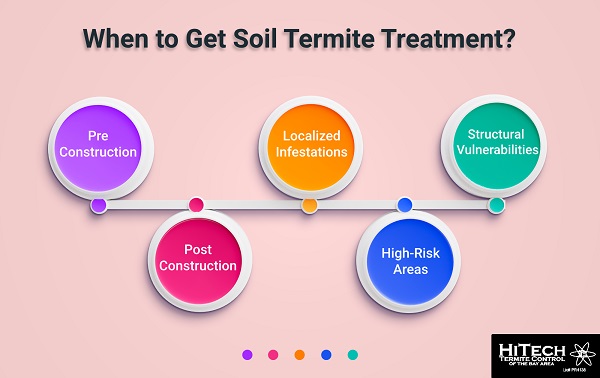When Should You Choose to Get Soil Termite Treatment?
 According to the National Pest Management Association, termites in the United States are responsible for property damages worth $5 billion annually. These silent destroyers are sneaky and the homeowners are left to bear the brunt of the financial burden. But beyond the statistics lies a deeper question: when should you take action against these unseen terrors?
According to the National Pest Management Association, termites in the United States are responsible for property damages worth $5 billion annually. These silent destroyers are sneaky and the homeowners are left to bear the brunt of the financial burden. But beyond the statistics lies a deeper question: when should you take action against these unseen terrors?
Some termite treatments aim at getting rid of the termite infestation and some prevent the termites from entering your home. For example, microwave treatment will eliminate the termites in a specific space while soil treatment for termites is a preventative method. Both types of treatments are necessary to safeguard your home against termites.
Timely Intervention Can Save Your Home
Picture this - you’re sitting in your cozy living room enjoying a movie night with your loved ones. Everything seems perfect until you hear a barely noticeable creaking sound that others most probably didn’t notice. It would be in your best interest to not ignore that sound as it could mean that a silent army of destroyers is slowly but steadily gnawing away at the very foundation of your home.
Here are some signs of a termite infestation that should trigger alarm bells in your head when you spot them in your house.
- Mud tubes
- Small pin holes on wooden surfaces
- A hollow sound when wooden furniture or wooden surfaces are tapped
- Termite droppings that mostly look like piles of sawdust
- Bubbling or peeling paint
- Abandoned wings
- Stuck doors and windows
- Buckling of wooden floors or ceilings
- Mild creaking sound due to the head banging of termite soldiers
- Live termites
There are many species of termites and their characteristics vary. For example, subterranean termites live underground while drywood termites live inside the wood they eat. The termite treatment to be employed will differ according to the termite type. Hence, it is best to contact a termite control company to do the termite inspection. An annual termite inspection can help identify the termite infestation in the early stages when it is easier to eliminate.
Subterranean termites are the most common species of termites found in the United States. These termites need moisture to survive and hence they build their nests underground. Soil treatment for termites is one of the most effective preventive treatments employed against subterranean termites.
Also Read: Termite Prevention During the Construction of New Homes
The Silent Threat: Understanding the Impact of Termites
Before delving into when to seek soil termite treatment, it is crucial to know some facts about termites.
- Termites thrive in dark and damp environments and this makes it easy for them to stay hidden.
- Unlike other pests that announce their presence with audible buzzes or visible trails, termites operate silently, without leaving any obvious traces.
- Termites feast on cellulose-rich materials like wooden furniture, drywalls, and even foundations 24/7 since they do not need sleep.
- Their non-stop munching can cause serious structural problems in the house, even before the infestation is found.
- Apart from the financial burden the termite damage causes, it can also take a toll on the homeowner’s mental and emotional well-being.
When to Get Soil Termite Treatment?
Soil termite treatment can prevent subterranean termites from entering your home. Paired with annual inspections, you can be at ease.
Soil treatment for termites is usually considered in these stages.
- Pre-Construction: If you are currently building your home, then this is an ideal time for the soil treatment method. You can treat the soil beneath the foundation and implement physical barriers to deter termite intrusion. Since the home is in the pre-construction stage, you avoid digging up your perfect lawn or disturbing the finished areas.
- Post-Construction: Treating the soil around the house is sometimes done after construction. It is best to consult with termite control professionals to decide on which type of treatment would be the best for your property.
- Localized Infestations: When termite activity is confined to specific areas of the property, targeted soil treatment is done to eliminate the threat. This method is effective for eliminating isolated colonies before they spread to other areas of the home.
- High-Risk Areas: Properties located in areas with high termite activity (such as the Southeastern United States) are recommended for proactive treatment methods like soil treatment. By creating an anti-termite barrier around the property, homeowners can prevent termite intrusions.
- Structural Vulnerabilities: Old properties and properties with known structural vulnerabilities (like excessive wood-to-soil contact and increased moisture levels) are at a high risk of termite infestation. Soil treatment can help fortify these properties and minimize the risk of infestation.
HiTech Termite Control
In your battle against termites, allow us to be your ally. At Hi Tech Termite Control, we offer a wide range of termite treatments including soil treatment and no tent solutions. If you suspect termite activity on your property, give us a call immediately and schedule a free inspection. Visit our website here for more details.
- Mar 07, 2024
